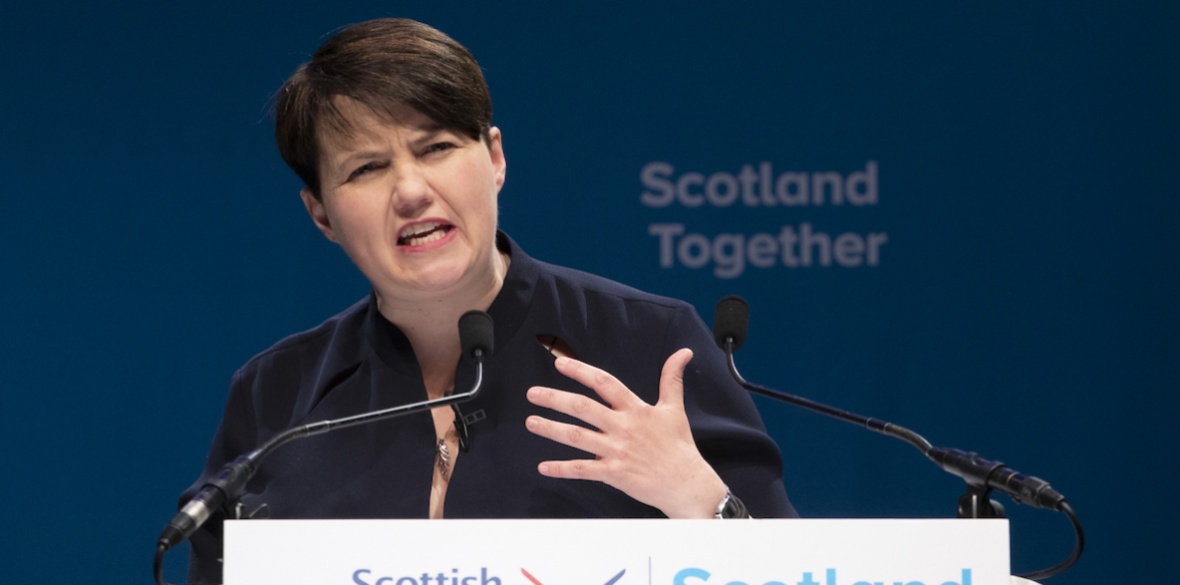This is the last article you can read this month
You can read more article this month
You can read more articles this month
Sorry your limit is up for this month
Reset on:
Please help support the Morning Star by subscribing here
“I WILL force myself to do things I’m scared of just to show myself I’m being stupid for being scared,” Ruth Davidson said at the Edinburgh International Book Festival earlier this month. Was this why she initially persisted as Scottish Tory chief under Boris Johnson’s leadership, or why she ultimately gave up?
Davidson’s rise to political prominence was rapid. She joined the Scottish Conservatives in 2009 on the day she handed in her notice at the BBC to pursue further study at the University of Glasgow. Within two years she had become the party’s leader.
Announcing her resignation eight years later, Davidson insisted it was motivated by personal circumstances, and not by Johnson’s ascendancy. It’s no surprise that having recently started a family, Davidson’s tolerance for the gruelling and discriminatory rigours of politics may have waned.
The real clanger came when her spokesman confirmed that Davidson in fact supports Johnson’s suspension of the UK Parliament. While this may have come as a shock to the chatterati which lauded Davidson as a liberal progressive, her record of support for the most brutal of Tory policies makes it entirely believable. So perhaps it’s time to ask whether Davidson’s issue with the new PM isn’t that he’s too different to her style of politics, but that he’s far too similar.
That’s not to say the talk of their mutual disdain for one another is untrue. Davidson has barely disguised it. Earlier this year she blocked Johnson from making an appearance at the Scottish Tory conference. In 2016 she made an explicit joke about the Tories “withdrawing our massive Johnson” in the 2016 leadership race. That same year her team briefed that if Johnson became PM, the Scottish Tories would break away from the national party.
Davidson, unlike Johnson, campaigned to remain in the European Union. Then again, but for the perception of circumstance and tactics ahead of the referendum, Johnson could well have done too. And was he the only one who took a tactical decision on the matter? Having both cut their teeth in journalism, Davidson and Johnson both know how to angle a story to validate the preconceptions of their respective target bases.
No doubt their time in the press has also helped both understand our media’s constant, desperate clamour to label individual Conservative politicians as loveable mavericks with liberal consciences. David Davis, Amber Rudd and, of course, David Cameron were all championed as beacons of ethics before their cruelties became so glaringly obvious it was more convenient to ditch them in favour of heroes anew — such as Davidson, handily still in opposition. Others, like Ken Clarke and George Osborne, have travelled in the opposite direction, championing hard-right policies in ministerial office only to become their critics from the sidelines.
Johnson’s time as a liberal hero is long forgotten, but that’s not to say it never happened. Some of the same north London arch-remainers who would now refuse to vote Labour over Brexit once happily flocked to the polls to vote Johnson in as the capital’s mayor.
While these memories have been handily erased, Johnson has cannily shifted his loveable rogue status to appeal to Brexiteers and the Tory rank-and-file. Like Davidson, he knows the power of a straight-talking persona and naughty anecdotes among the latter. It’s no surprise that both, along with Jacob Rees-Mogg, have consistently been the delegates’ favourites on the party conference fringe circuit.
Out of power, Davidson has managed to cling onto her veneer of progressive politics. And at the Book Festival this month, the crowd was lapping it up. The Scottish Tory leader kept insisting she wanted to talk about the inspiring women she wrote about in her recent book — but she was far more of a natural in discussing number one.
But how long would she have been able to balance appealing to liberal audiences with support for Johnson’s politics and his Brexit plan?
Not so long ago, as was readily apparent at the Scottish Tory conference this year, Davidson was hoping to lead Holyrood’s first Conservative government — and stood a chance.
But with a similar character having already made the transition from cheeky panel shows and outspoken newspaper columns to the grim realities of Tory government down south, this plan was looking a lot less convincing. If that was her thinking, we should at least give Davidson credit for recognising that her moment had passed.

 Conrad Landin
Conrad Landin








